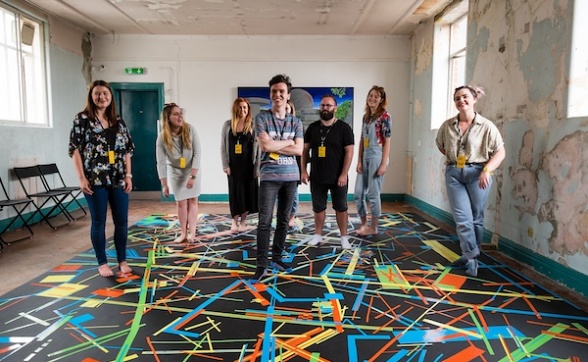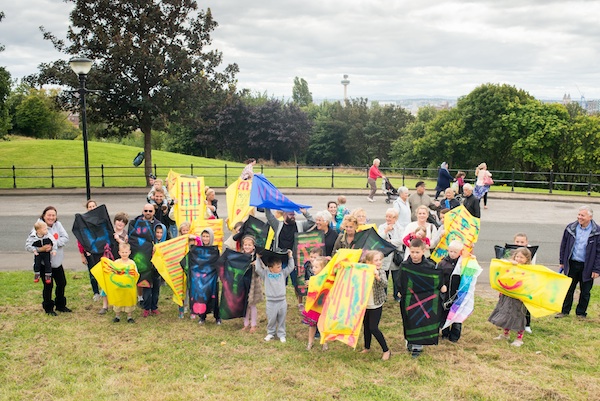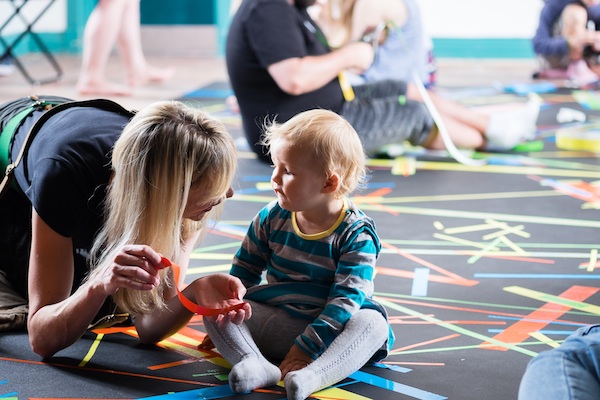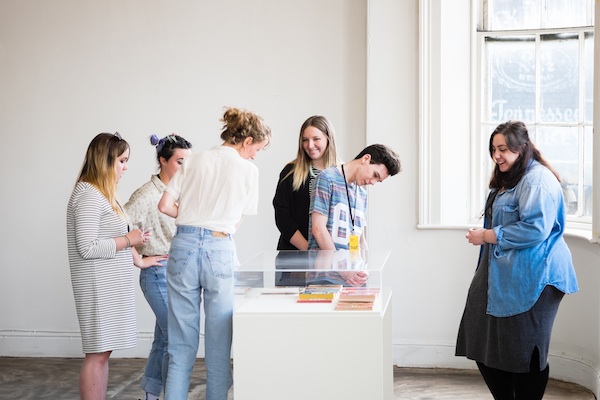Interview with Polly Brannan, Education Curator
Posted on 16 October 2014 by Liverpool Biennial

Liverpool Biennial Young Fellows at Sunday Art School: Thinking in Colours © Pete Carr, 2014.
Liverpool Biennial Young Fellows at Sunday Art School: Thinking in Colours © Pete Carr, 2014.
The last Sunday Art School of this year's Biennial takes place on 26 October and is part of a wider, on-going Education Programme by Liverpool Biennial which engages families, students, and communities across the city. We interviewed Education Curator Polly Brannan to find out more about her job, as well as her vision for the programme and what to expect in 2015.
Tell us a bit about yourself and how you came to work at the Biennial
I have worked as a practicing artist in the field of public realm and engagement for ten years and have worked on many programmes at galleries including the Hayward Gallery, Studio Voltaire and the Serpentine in London. About five years ago, I set up an organisation called Avant Gardening, and in 2012, was invited by Liverpool Biennial to come up and work on the Fritz Haeg People’s Park project in Everton Park.
"Education needs to be a real passion within the organisation for programmed activity to be done properly."
For this project, I worked with Fritz and the Biennial team to put together a public programme of talks and events in the park throughout Liverpool Biennial 2012, which connected to the history of Everton Park, the future landscape and what was happening there at the time. I was also invited to produce a film about the project. I really enjoyed working in Everton and met so many people while I was in the city, so when Sally Tallant (who I’d worked with previously) was appointed as Director of Liverpool Biennial, she invited me to apply for a maternity cover role as a Participation Coordinator, and I was then offered a permanent position as Education Curator.
How is the role of Education Curator different from being an Engagement or Participation Coordinator?
In my experience, in bigger institutions education is quite often more of a facilitation role, rather than a curatorial programming position where you work alongside other curators. Here at Liverpool Biennial, mainly because of our Director whose passion and background is in education, it is a big part of everything we do, and so from that top level, education is part of our whole team's ethos and approach. As Education Curator, I work together with the rest of the programme team on all projects; from big public art commissions with stakeholders to the Sunday Art School family programme and our Mediation school, so it’s a very varied role.

Sunday Art School: Moving Patterns at the Everton Park Kite Festival © Pete Carr, 2014.
Do you think that it is important for there to be an education department in all arts organisations?
Yes, I think there definitely is a responsibility to do it, but also I believe that if the heads or the directors of those places are not supportive of it, then the education programme just doesn’t work. Education needs to be a real passion within the organisation for programmed activity to be done properly. For me as an artist running those types of projects independently, my interest has been about testing ideas of sustainability within these educational projects, and in order to achieve that, I felt like I needed to be part of a bigger institution, so the opportunity I have at Liverpool Biennial is perfect.
Can you tell us more about Sunday Art School, and what the aims of the programme are?
Sunday Art School is a monthly programme, where we invite artists to lead a drop-in experimental workshop. It is not a facilitated workshop where you make something and go home; it's really about exploring ideas together with the artist. The format is open to anyone and everyone - it is for all ages and we really welcome everybody.
What we have found throughout the programme is that a lot of the time, people bring their extended family and stay for the whole session, or those passing by will just come in, which is brilliant! Sunday Art School is intended to be an experimental framework, where people can come in and observe, or get involved and stay for 5 minutes or the whole four hours. It's all about being part of the process of making work together, we also see the sessions as a way of opening up a studio-like space and exploring how artists work.

Sunday Art School: Magical Shapes © Rob Battersby, 2014.
What can we expect from the next Sunday Art School session with Kevin Hunt?
Our last session of this series is at The Old Blind School on Sunday 26 October, running from 1-5pm. Throughout the Biennial, we have worked with Kevin Hunt who has been our Artist-in-Residence, and has been looking at the Dazzle Ship and Carlo Cruz-Diez’s work as a starting point to think about art and illusion. This has led him to looking at lots of things to do with magic, as well as the decorative and illusion in everyday life.
"Sunday Art School is a great way of engaging with our audiences locally, and from the North West"
Kevin has used these frameworks to open up interesting questions for each session, such as "how do we see rhythm" or "can objects defy gravity", and this in turn has informed his own practice and projects. The last session will be a culmination of all of Kevin's Sunday Art School sessions, so it's going to be very exciting. He will be inviting people to learn magic tricks, and there will be films and performances and lots of different thing going on. Afterwards at 6pm, there will be a 'Grand Finale' where we will invite everybody from all over the city and beyond, to celebrate the last day of the Biennial, with work from Sunday Art School on display and magicians performing too.
What happens next for Sunday Art School after Liverpool Biennial 2014?
We will of course be back, probably in January 2015, when we will be working with more artists based in the city. Sunday Art School is a great way of engaging with our audiences locally, and from the North West, and Liverpool Biennial sees these people as our core audience, who we would like to engage with our other programmes. Sunday Art School is a regular feature of Liverpool Biennial, so look out on the website for more information coming soon.

Sunday Art School: Thinking in Colours © Pete Carr, 2014.
How have families responded to Sunday Art School so far?
We have regulars who come back all the time which is brilliant, and they feel that it's a real opportunity to work together as a family. The sessions aren't just for children, and it's always great to hear that people who come enjoy the process of participating and making something together. Those people often stay for the entire session, and bring their lunch to make a day of it, and the children are always really excited about this experimental way of working and having the opportunity to make large scale things together. We also get a lot of people who are passers-by, which is great and we now have networks to lots of mothers groups too. We are always eager to have more new faces come and join in!
Another strand of the education programme is the Young Fellows, in addition to outreach projects with different community groups in the city. What will happen with these programmes after the festival finishes?
The Young Fellows programme was something that we piloted as part of the Mediation programme, where we worked within curriculum time with students from Hope University and The City of Liverpool College - and it was really successful. At the end of the summer term, we brought all of these students together for a series of sessions about the Biennial and artists, and they created their own blog where they interviewed all the artists behind the scenes and got really involved in things going on city-wide. A few of those students have continued to work with us throughout the summer and have supported Kevin at Sunday Art School, and also worked with him at Model, his gallery space on Wood Street. All of the groups we engaged with are keen to work with us again, and we are now looking at a larger-scale model for the Mediation school which will be slightly different from before, but continue to work with those same groups in a more integrated programme.
"Education is at the core of everything that we do and our approach is to work with various groups and individuals to create projects that have a lasting impact on the city"
We are also collaborating on a project in Everton Park which will be an amazing achievement for all groups involved. We have been working closely with the local young people, as well as Friends of Everton Park and Liverpool City Council. We have commissioned a leading contemporary artist for this project, details for which will be revealed soon!
Lastly, we have Kevin’s final few weeks as Artist-in-Residence and to round things off we will have a number of sessions at The Old Blind School where invited groups will be coming for an alternative tour of the exhibition. There will also be additional workshops in the studio he has been using at the venue, where we will be doing screen printing and installation as part of his larger installation which has been building up over this whole period of time. There is a mix of different groups who will be attending these workshops, and then A GRAND FINALE on 26 October will be open to everyone.

Liverpool Biennial Young Fellows on a tour of the Biennial Exhibition at The Old Blind School © Pete Carr, 2014
What do you hope the education programme to achieve; in terms of the effect on the city and the people who come to the workshops?
I believe that education is at the core of everything that we do and that our approach is to work with various groups and individuals to create projects that have a lasting impact on the city. From my experience of doing a programme which gives young people the opportunity to make art that they do not normally encounter at school, to doing long-term projects which stay in the city permanently as a feature, I have found it really interesting that education and art can be key players in the city, working closely with the council and parks to form a positive vision of Liverpool.
And lastly, what is your favourite part of your job?
Definitely working with many different people across the city. For me, it is just as important to work with a school as it is to work with Friends of Everton Park. Through working with all of these different types of groups, I am able to understand the city which is still rather new to me, so it is interesting to learn about Liverpool though people and their stories and experiences here. I also love that at Liverpool Biennial we are an integrated team, working together on programmes.
The next Sunday Art School takes place on Sunday 26 October, from 1-5pm at The Old Blind School.
Liverpool Biennial
55 New Bird Street
Liverpool L1 0BW
- T +44 (0)151 709 7444
- info@biennial.com
Liverpool Biennial is funded by
Founding Supporter
James Moores